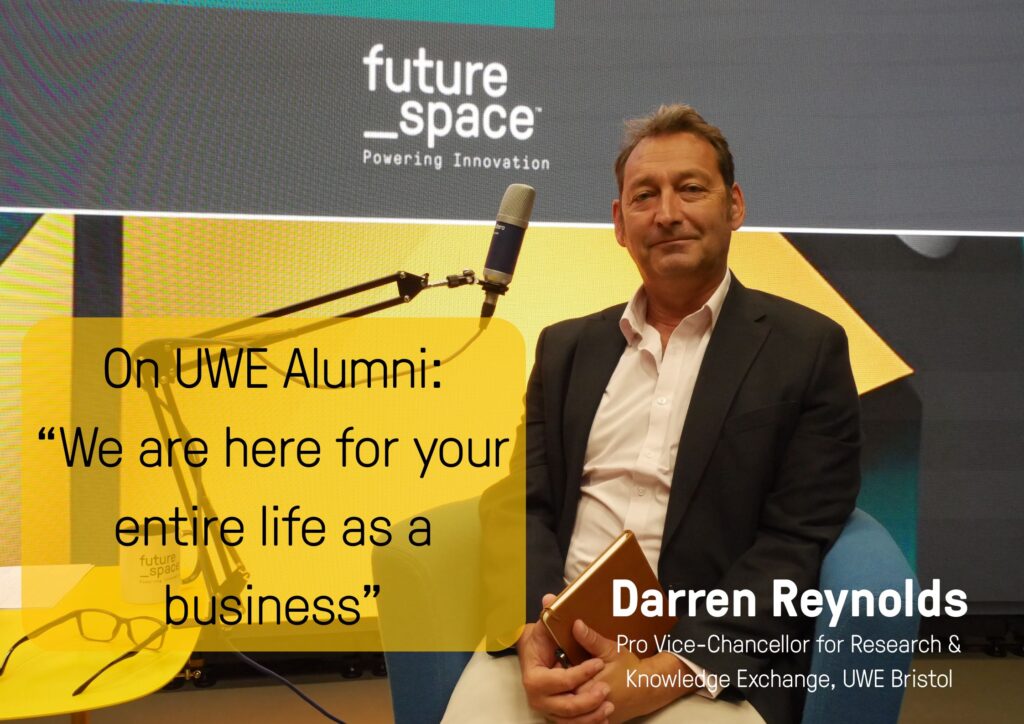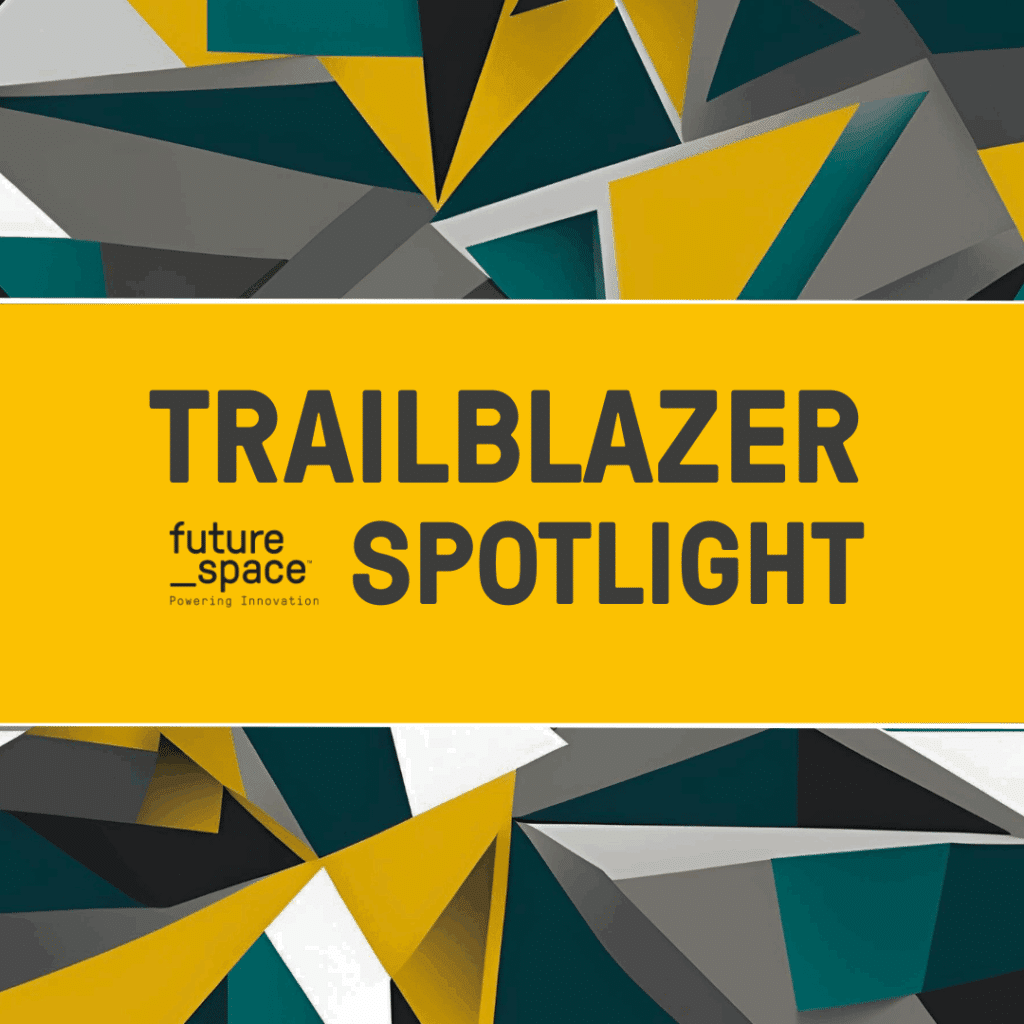In this month’s Trailblazer Spotlight, we sat down with Professor Darren Reynolds, UWE Bristol’s new Pro Vice-Chancellor for Research and Knowledge Exchange, to talk about the future of university-led innovation and how Future Space can help turn big ideas into real-world change.

When Professor Darren Reynolds stepped into his new role as UWE Bristol’s Pro Vice-Chancellor for Research and Knowledge Exchange earlier this year, he did so with the heart of a researcher and the curiosity of an entrepreneur.
“I’m a researcher first and foremost,” he says. “If you were to open me up, that’s what I’d look like. But over the years, my work has naturally moved towards businesses — particularly those applying science and technology to solve real problems, whether in agrifood, health, or the environment.”
That bridge between academic discovery and practical application is at the core of Reynolds’ approach — and one of the main reasons he took on the role.
“The idea of taking something out of a filing cabinet or someone’s notebook and helping it make a real difference — that’s what motivates me,” he explains. “This role gives me the opportunity to do that at a scale I could never achieve as a single researcher.”
Introducing RISE: A New Agenda for Research, Innovation, Skills and Enterprise
Much of Reynolds’ focus right now is on embedding UWE Bristol’s new RISE strategy across the university and the region.
Standing for Research, Innovation, Skills and Enterprise, RISE marks a shift in how the university defines its role — not just as a place of learning, but as an active partner in shaping the economy and community around it.
“For me, RISE connects the internal world of the university with the external world of business, society, and place,” he explains. “It’s not just a slogan. It’s about describing the texture of the university — what it feels like, what it stands for.”
That texture is defined by collaboration. “Research and innovation are part of the same ecosystem,” Reynolds says. “We’re focused on turning ideas into tangible solutions, developing skills for the workforce of tomorrow, and working in partnership with businesses and civic organisations.”
It’s also about balance — between environmental responsibility and economic progress. “We can’t separate climate and ecological issues from economic security,” he argues. “We need good, green growth — and that means working with the right partners to drive innovation in ways that serve people and the planet.”
Creating the Conditions for Collision
So how does that philosophy translate into action?
For Reynolds, it’s about creating the right conditions for what he calls “collisions” — the creative encounters between researchers, entrepreneurs, and problem-solvers that spark new ideas.
“Collisions are fundamental to human creativity,” he says. “If you don’t create opportunities for people to come together — physically or virtually — you don’t get innovation.”
That’s why he sees spaces like Future Space as crucial. “They’re not just buildings. They’re conduits where creativity and technology meet. They’re places designed for people to collide — for ideas to flow.”
But making those collisions happen requires intention. “People are time-pressured. They often don’t feel they have the time to think, to be curious, to meet someone new with an idea. We need to design systems and spaces that make that not just possible, but irresistible.”
He offers a metaphor: “If we swap cups of coffee, we still each have one coffee. But if we swap ideas, we both walk away with two.”
Future Space: The Bridge Between Academia and Enterprise
When asked about Future Space’s role in the wider RISE agenda, Reynolds doesn’t hesitate. “Future Space is absolutely critical,” he says. “It’s the interface between the university and the outside world — where innovation, enterprise and business development actually meet.”
For him, Future Space represents the sweet spot between academic depth and entrepreneurial agility.
“Universities are incredible engines for ideas,” he explains, “but they’re not always the best place to turn those ideas into businesses. That’s why we need entities like Future Space — connected to the university, but also free to operate in the market, to test, grow and scale ideas.”
Reynolds describes Future Space as “a vital amplifier of collisions” — bringing together startups, researchers, students and industry partners in a shared ecosystem. “Some of the most exciting innovation happens in that overlap,” he adds. “You have people with brilliant research insight meeting entrepreneurs with the drive to commercialise it — and that’s where magic happens.”
He also believes that spaces like Future Space are essential to the UK’s regional innovation economy. “We sometimes forget that universities are major economic engines,” he says. “The Enterprise Zone, Future Space, the Bristol Robotics Lab — they’re all part of a network that powers the region’s growth. The challenge now is scale: making sure those connections happen at every level, from student startups to global industry collaborations.”
Ultimately, Reynolds sees Future Space not as an adjunct to the university, but as a strategic partner in achieving its civic and innovation mission. “The real challenge isn’t having ideas,” he concludes. “Ideas are everywhere — in classrooms, on buses, in cafés. The challenge is building systems that let those ideas become reality. That’s exactly what Future Space exists to do.”
As UWE Bristol’s new RISE strategy takes shape, Reynolds’ message is clear: innovation happens when people collide, when ideas are shared, and when passion meets purpose. With spaces like Future Space leading the charge, the South West’s innovation ecosystem has never looked more vibrant — or more vital.
